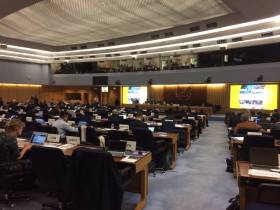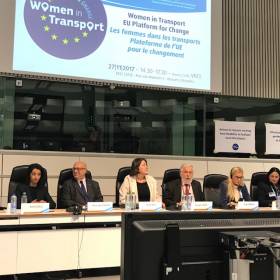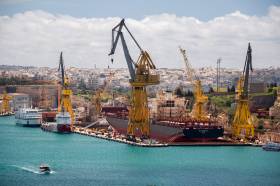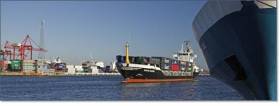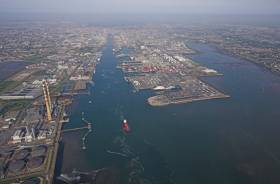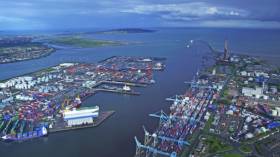Displaying items by tag: ESPO
#Ports&Shipping - Next week the International Maritime Organization (MEPC 72)1 is expected to adopt its Initial GHG Strategy for shipping.
The discussions aim to include in the Initial Strategy a CO2 emissions reduction target for the sector as well as potential short, mid, and long-term reduction measures. Once adopted, this strategy will be the contribution of the sector to the Paris Agreement. Together with all other national reduction commitments, it will be tested whether it is fit for the purpose at the “stock-taking” meeting planned later this year. The EU has recently agreed on a position with regard to the negotiations in the IMO on a CO2 emissions reduction target.
ESPO the European Sea Ports Organisation, supports the EU's position and believes that it is a positive contribution to the IMO discussions.
“The Initial GHG Strategy will allow shipping to take part in the stock-taking meeting under the Paris Agreement in 2018. We need global action but we need it on time. There is a sense of urgency in order for the sector to contribute to the Paris objective to keep the increase of global temperature well below two degrees. We hope that the EU position will be well received and will be considered by the negotiators as a constructive contribution to finalizing and adopting the Initial IMO GHG Strategy next week. It is good to see that it is already receiving some support on the shipping side as well,” says ESPO’s Secretary General, Isabelle Ryckbost.
Ports, coastal cities, and their local communities are amongst the most vulnerable to extreme weather conditions resulting from global warming. Under the Paris Agreement, all countries and all sectors of the economy need to take immediate action and to contribute to keeping the increase of the global temperature well below two degrees.
The EU and national climate measures that are currently being developed to implement the Paris Agreement oblige ports to reduce the carbon footprint of their land-based activities. In parallel, European ports aim to facilitate the decarbonisation of shipping by providing green services, where possible. Under the EU Alternative Fuels Infrastructure Directive, LNG bunkering facilities and On-shore Power Supply should be provided to ports of the TEN-T core network by 2025.
1 IMO’s Marine Environment Protection Committee
#Ports&Shipping - The European Commission last week published the new proposal on the revision of the Port Reception Facilities (PRF) Directive.
In response to the new proposal, the European Sea Ports Organisation (ESPO) has welcomed in principle its objective to build upon the substantial progress achieved under the existing Directive.
European ports believe that any provisions leading to better enforcement of the obligation for ships to deliver waste at shore are welcome. The alignment of specific elements of the Directive with the International Convention for the Prevention of Pollution from Ships (MARPOL) gains ESPO’s support. ESPO also believes that addressing the waste from fishing ships (fishing nets) and recreational craft will lead to a more comprehensive policy of tackling the sea-based sources of marine litter. Finally, European ports welcome that new types of waste, such as scrubber waste, have been addressed.
“We welcome that the proposal seeks to increase efficiency, reduce administrative burden and aims to fully respect the ‘polluter pays’ principle. We now need to assess in detail the concrete provisions that are on the table and see if the options put forward by the Commission are the best way to guarantee an efficient but responsible regime for managing waste from ships. Ship generated waste has always been a high priority for European ports. Port authorities are certainly willing to take their responsibility within their competences and financial possibilities”, says ESPO’s Secretary General Isabelle Ryckbost.
ESPO recognises that better enforcement is not the only way to reduce the waste discharged at sea. Providing the right incentives is equally important. The fee system introduced by the current Directive whereby ships are paying a fixed minimum fee when calling at a port, whether they are delivering waste or not, has certainly contributed to the delivery of increased quantities of waste on shore. European ports understand that strengthening this incentive policy is part of the current proposal. However, introducing a fee system whereby ships can deliver unlimited amounts of garbage, including dangerous waste and cargo residues for a fixed fee seems to be a severe and unacceptable divergence from the ‘polluter pays’ principle. It risks to discourage tackling waste at source by reducing volumes generated onboard, which has been the cornerstone of the EU waste policy.
“The incentives as foreseen in the current Directive have without doubt been effective in reducing the waste gap. Continuing on this path seems a reasonable choice. Setting a price for an average quantity could be workable. But allowing ships to deliver even unreasonable quantities of garbage or dangerous waste for a fixed price would neither be responsible nor efficient. Equally we believe it is up to the port to decide if and when a rebate on the fee can be given to a ship. We may not forget that receiving and managing waste comes at a cost. It is the port authority that will have to pay the difference between the fee and the real costs of receiving and handling the waste amounts actually received. The proposal is now on the table. We are open to further discuss the issue with the Commission, Parliament and Council and are confident that a good solution can be reached,” adds Isabelle Ryckbost.
ESPO Participates in Launch of EU Platform “Women In Transport”
#WomenInTransport - The EU Commission and the Economic and Social Committee launched on Monday a new platform aiming at strengthening Women’s employment and equal opportunities for men and women in the transport sector.
Only 22% of the people working in the transport sector are women. In waterborne transport, it is only 20%.
The specific objectives of the platform are to improve the opportunities for women in management and decision making, to improve the working conditions for women in the transport sector and to change the culture.
European Sea Ports Organisation (ESPO) is one of the participating organisations in the platform and thus member of the platform.
To take the message forward, ESPO intends to bring together the human resource managers of European ports not only to discuss recruitment policies, but also to exchange possible best practices and see if any lessons can be learnt.
Next to being a member of the Platform, transport organisations can sign the Declaration. More information about the Platform and the Declaration can be found here:
In another notable development according to ESPO was the EU Parliament and Council in Reaching an agreement on Shipping's CO2 Emissions
The agreement reached earlier this month is in regard to the CO2 emissions from shipping that was agreed to align any EU action with the International Maritime Organisation (IMO) timeline.
This compromise is a part of the first reading agreement on the review of the EU Emission Trading Scheme (ETS) Directive. The agreed text wants the IMO to introduce an ambitious emission reduction target and accompanying measures by 2023.
In particular, the agreement sets two milestones by saying that an IMO emission reduction target in 2018 as part of its initial strategy has become a matter of urgency and that action either at IMO or EU should start from 2023.
Organisations Across Europe Ask EU to Invest More in Transport
#ports&shipping - “More EU budget for transport, the best investment plan for Europe” is the slogan launched today from a coalition of thirty European transport organisations. The campaign is calling for a strong connecting Europe Facility for the next financial period 2021-2028.
“We are very pleased to see that 30 transport organisations, covering all modes and nodes, service providers, users and cargo owners are supporting this plea for a strong financial support for the completion of the TEN-T network. 750 billion euro is needed to complete the TEN-T core network. We all know that transport projects with a high societal return do not always generate the necessary return on investment. We also believe that CEF support is the best guarantee to deliver high EU added value and responsible grant management”, says ESPO’s Secretary General Isabelle Ryckbost.
The ESPO Secretary will present the campaign on behalf of the Coalition at the Connecting Europe Conference beginning today which Afloat previously highlighted and is taking in the Estonian capital of Tallinn.
“Ports face a continual challenge to invest in long-lived port infrastructure. Even where such investments provide high added value and generate substantial economic returns, they often have low financial returns for the port authority. In the context of the review of the Connecting Europe Facility, ESPO will continue to make the case for continued and increased financial support in a variety of forms. Grants are an essential component of this”, says ESPO’s Chairman, Eamonn O‘Reilly.
The coalition's campaign has a leaflet that can be downloaded here.
Source: European Sea Ports Organisation (ESPO).
Afloat adds that O'Reilly is also the chief executive officer of the Dublin Port Company where major redevelopment works are underway at Alexandra Basin (see photo). The project is part of the port's masterplan. Next month as part of Open Dublin House, a boat tour is to take the visiting public into the basin to examine the works in progress.
#PERSaward - The European Sea Ports Organisation (ESPO) has awarded Shannon Port Authority and four other ports for achieving the Port Environmental Review System (PERS) certification.
Congratulates went also to the Port of Barcelona (Spain), Port Authority of Melilla (Spain), Niedersachsen Ports Emden (Germany) and Shoreham Port Authority (UK) .
ESPO Secretary General, Isabelle Ryckbost, ESPO Chairman, Eamonn O’Reilly, and Sotiris Raptis, EcoPorts coordinator, handed over the PERS certificates to the ports’ representatives during the ESPO Conference dinner, which took place yesterday evening at Casa Llotja de Mar in Barcelona, Spain.
“The number of ports under the EcoPorts network certified with the PERS standard has recently risen to 28 members. This marks the anniversary of 20 years of EcoPorts and further strengthens the network whose primary objective is to assist more European ports to protect the environment, improve public health and address the challenges of climate change”said Sotiris Raptis, EcoPorts coordinator and senior advisor for environment at ESPO.
PERS is the only port sector specific environmental management standard. It is the flagship product of the EcoPorts network and is offered as part of the ESPO services to its members through the EcoPorts website: www.ecoports.com
Compliance with the PERS standard is independently assessed by Lloyd’s Register Quality Assurance and the certificate has a validity of 2 years. There are 25 ports in Europe and its neighboring countries currently certified by PERS. ESPO encourages all ports within its membership to implement the scheme and to get certified.”
ESPO Mark the Maritime Year of the European Union
#MaritimeYearEU -The European Sea Ports Organisation (ESPO) issued a statement yesterday to contribute to Maritime Year of the European Union and to follow up on the Valletta Declaration, the ministerial declaration on maritime transport, adopted on 28 March focusing on competitiveness, digitalisation and decarbonisation.
“We welcome the Valletta Declaration as a first milestone of the Maritime Year,” says ESPO’s Secretary General, Isabelle Ryckbost. “We hope that the Maritime Year will reinforce the support for modern, sustainable and well-connected European ports, will pave the way for maritime trade facilitation and simplification and, last but not least, will embrace the sustainable agenda of European ports”.
“We look forward to working further with the Commission and with the Maltese and Estonian Presidencies to make this Maritime Year a success in strengthening the European maritime and ports sectors.” says ESPO’s Chairman Eamonn O’Reilly.
In essence, ESPO’s statement reiterates the importance of well-connected and modern ports. Ports in Europe are facing several challenges that have a major impact on the requirements for infrastructure investments’ needs. For European ports it is important that Europe continues to increase its investments in the port sector. CEF grants are and must remain the critical component of the funding mix. ESPO calls on European and national policymakers to consider ports as strategic assets. Investments in essential and/or critical European port infrastructure of general interest should be assessed from that perspective.
In view of facilitating maritime trade, European ports plead for administrative simplification and removing customs obstacles to EU goods transported between European ports. The focus should lay on simplification (reduce formalities) and harmonisation (asking the same data in the same way). The most innovative digitalisation technologies should be fully taken into account when developing a single window environment. Moreover, interfaces and platforms can only function if they have a governance dimension: they must receive the competences and responsibilities needed to pass the right information to the different authorities. If not, the single window will not result in trade facilitation and simplification, but will just shift the burden from the ship side to the competent authorities.
ESPO and its members express their concern about possible new trade barriers and their impact on the free flow of goods and just-in-time logistics. If new trade barriers are being introduced, these should be tackled in the most effective way. Every effort should be made to ensure that European ports can remain efficient and seamless entry and exit points for trade.
Last but not least, ESPO and its members put a strong emphasis on their sustainable agenda. As an essential part of the logistic chain, main gates to the world, nodes of energy and industry clusters, European ports must contribute to the global, European and national climate and decarbonisation agenda. In that respect, ESPO strongly believes that IMO would be by far the optimum forum in which to introduce CO2 target and measures to reduce emissions from shipping in line with the Paris Agreement. However, 2023 must be seen as a milestone. A six year period is sufficient time for the IMO to discuss and agree on the necessary target and measures.
Moreover, as nodes of energy and increasingly important clusters of industry and blue economy, ports in Europe are developing a low carbon strategy. The first aim is to cut emissions and improve energy efficiency. But, ports should also turn the path towards decarbonisation into a successful business case. Finally, ports in Europe will have to adapt the port infrastructure to the effects of the warming. They are at immediate risk as sea levels rise and extreme weather conditions occur.
The decarbonisation of the shipping industry as well as the overall greening of the shipping sector, imply additional investments and facilities in ports. Some of these investments will not be bankable in the short run. Additional grants and other financial instruments are essential for decarbonising the ports, for making ports more resilient to the consequences of climate change and for helping ports to contribute to decarbonising the economy.
As regards air quality, ESPO very much welcomes the decision of IMO to introduce a global 0.5% sulphur cap in 2020. This decision is expected to bring enormous environmental and public health benefits.
Finally, as concerns the forthcoming review of the waste reception facilities directive, European ports are of the opinion that the current directive has been successful in substantially decreasing ship waste discharged at sea. ESPO supports the alignment of the directive with MARPOL. The review should however safeguard the flexibility of the different fee systems while addressing the problem of delivery of an “unreasonable” amount of waste in a given port.
Read the full statement here.
#PortRegulation - The European Commission, Council and Parliament after 15 years of discussions, have reached an agreement on a Port Regulation, a legal European framework for organising the port services and financial transparency for ports in Europe.
This week at the 4th trilogue meeting, the Dutch Presidency and the EP main negotiators reached a compromise. The port regulation can however only be considered as adopted after the formal approval by both the Parliament and the Council following their respective procedures. This formal approval process is expected to take place in autumn.
The European Sea Ports Organisation (ESPO) believes that the final compromise is, in many ways, a significant improvement on the original Commission proposal of May 2013. European ports welcome in particular:
A flexible framework for the organisation of port services respecting the diversity of port in Europe by allowing different tools (limitation, PSO, internal operator,…);
More financial transparency when ports receive public funding;
The way the initially very prescriptive provisions on customers and stakeholder relations have been amended in favour of more realistic general principles on how to deal with stakeholders and port users;
The fact that the concept of an “Independent Supervisory Body” was abandoned in favor of a more hands-on and less bureaucratic provision setting out a good mechanism for handling complaints;
The decision not to enlarge the scope of the directive on the award of concession contracts 2014/23/EU through this regulation.
ESPO however regrets that national governments have not shown more ambition in moving towards a clear framework for port authorities to set their own charges and develop their own financial strategy. European ports believe that the plea for less public funding for ports can only be realised if port authorities can manage themselves their financial situation and decide how to structure and optimise their income.
ESPO and its members considered the principle of autonomy as put forward in the initial Commission proposal and fully supported by the European Parliament as one of the main assets of the Port Regulation and an important condition for unleashing the potential of all European ports in Europe.
ESPO fully recognizes that the final text of Article 14 will be giving port authorities in Europe the possibility to determine the level and structure of the port infrastructure charges and to enter into individual negotiations with their customers. It remains however unclear to what extent national governments may limit this negotiating power of port authorities by setting general requirements within their national ports policy.
“The final text of Article 14 on infrastructure charges may be seen as a sort of consolidation of the current 2-tier system consisting of ports which can develop their charging system in an autonomous way and those ports that do not have these basic management tools. We must hope however that Member States will use this opportunity to review the way they consider ports and to realise that giving port authorities the power to negotiate and to develop their own charging policy is the best way to enhance the competitiveness of European ports and the level playing field”, says Secretary General Isabelle Ryckbost.
“We would like to thank the Commission, the Council and the Parliament for their constructive cooperation during this legislative process. Our special thanks go to the Rapporteur, Knut Fleckenstein, for his continuous support in favour of giving European ports more autonomy. We regret that the port regulation has not delivered fully on that point.” says ESPO Chairman Santiago Garcia Mila.
Key Trends Identified by ESPO in Port Governance
#PortGovernance - Independent management, masterplanning and digitalisation are among some of the trends in EU port governance highlighted by the European Sea Ports Organisation (ESPO) in its 2016 Fact-Finding Report.
Port Strategy writes that the report states most port authorities in Europe remain publicly owned. Full ownership by the state or by the municipality remains predominant, while only a few port authorities combine ownership of different government levels. Mix public-private ownership, meanwhile, is still much rarer and exists in just a few European countries.
The report noted, however, that seaports are moving towards more independent private-like management. “Compared to 2010, more port authorities are structured as independent commercial entities and operate in a commercially-orientated manner. In 2016, they account for 51%of the respondents. Next, 44% or port authorities are still independent public bodies with their own legal personality and different degrees of functional and financial dependency from the public administration,” it said.
To read more, click here.
#WeighingContainers - All “shippers” as from July 2016 must declare to the carrier in advance the verified weight of packed containers.
The European Sea Port Organisation (ESPO) has joined the European organisations representing Shippers, Freight Forwarders and Terminal Operators in the call on national authorities to avoid any disruption in the logistics chain and to take action in coordination to preserve level playing field.
To ensure that the implementation of the new legal requirements does not create competition distortion through a patchwork of varying national measures, Member States should pursue a coordinated approach, taking into consideration the national guidelines of other Member States when deciding on national rules. Commonly accepted guidelines between supply chain actors and national authorities could minimise distortion of competition and ensure smooth functioning of the SOLAS requirements.
Being only two months away from the entry into force of the SOLAS convention, Member States should bring clarity as soon as possible.
In November 2014, the International Maritime Organisation (IMO) agreed upon rules for the mandatory weighing of all sea-bound containers to be loaded on a vessel. The undersigned organisations accept these rules and are committed to working towards the successful implementation of the new legal obligation.
Dublin Port Hosting 2016 ESPO Conference In June
#ESPO2016 - The European Sea Ports Organisation (ESPO) is inviting its members, policy makers and stakeholders to join in the 13th edition of its annual conference, which will be hosted by the Dublin Port Company at The Printworks in Dublin Castle on 2-3 June 2016.
The 2016 ESPO Conference, moderated by broadcaster Claire Byrne, will look into ways to improve the efficiency of maritime transport and ports from different angles.
The first session will focus on the different barriers to the internal market for maritime transport. As maritime policy is at the top of the 2017 European Commission agenda, the ESPO conference aims at preparing the ground for this important year for the maritime and port sector and at feeding further discussions.
Is there a digital agenda for ports? Is there a role for policy? How can ports utilise 'big data' to their benefit? Are we ready to open up the flow of data? How to protect ports against risks of cybercrime? All these questions will be tackled in the second session.
The third session will address the issue of 'game changers' and possible 'game stoppers' when it comes to easing trade. The conference will investigate how TTIP, the trade agreement under negotiation with the US, could possibly benefit ports, on both sides of the Atlantic.
The conference will further zoom into the Chinese 'One Belt, One Road' policy and assess how it might affect European port-hinterland dynamics, as well as the possible impact of a 'Brexit' for UK and neighbouring ports, and how temporary border controls are impacting the European transport and logistics chain.
As usual the conference will close with a policy debate where high-level EU policy makers will present their views on the issues discussed during the conference and enter into a final debate with port authorities.
DG MOVE’s director general Henrik Hololei; Mark Frequin, representing the Dutch Presidency of the Council of Europe; and Pat Cox, former president of the European Parliament and TEN-T coordinator for the Scan-Med Corridor are getting prepared for this session. MEP Knut Fleckenstein will address the conference at the end of day one.
On 3 June, American top economist and influential thinker Jeremy Rifkin will give a keynote address on the theme of 'a Third Industrial Revolution and a Zero Marginal Cost Society'.
The first day's conference sessions will be followed by the Admiral’s Ball, a gala black tie evening celebrating the Lord Mayor of Dublin’s honorary Admiralty of Dublin Port.
The event also launches the Dublin Port Riverfest with a sophisticated evening of fine dining and premium entertainment promised for a guest list of Dublin’s premier business hub and international conference delegates.
Full details of the conference schedule can be found at the ESPO website HERE.



























